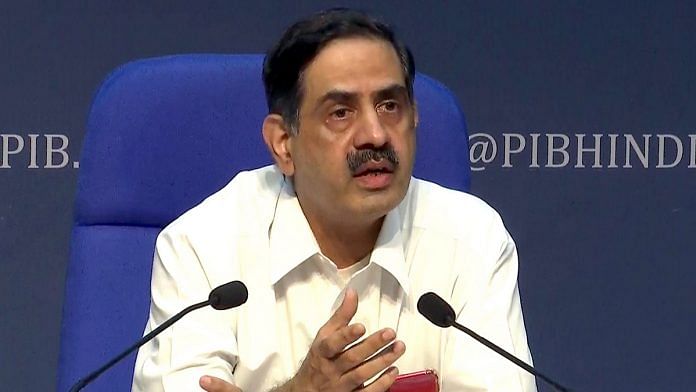New Delhi: The Indian Council of Medical Research (ICMR) has dismissed reports that it hushed up data from the country’s first nationwide sero survey that found a Covid-19 prevalence of up to 48 per cent in containment zones as early as May.
In a series of tweets, the ICMR said the data for containment zones wasn’t released because it didn’t have a bearing on the nationwide trends for Covid-19 exposure. They were meant to guide states, and were conveyed to them, it added.
The ICMR’s clarification came after The Telegraph reported that the team behind the sero survey, conducted between 11 May and 4 June, was asked by ICMR Director General Dr Balram Bhargava to either hold back the report from public release or remove the data on containment zones. The basis of the report was statements from seven of 74 researchers involved in the survey.
According to the report, Dr Bhargava had told the researchers that the council didn’t have the approval to publish data from hotspots or containment zones.
The sero survey in question sought to determine Covid exposure by testing random blood samples from 400 people each in 70 districts, and 500 each from 10 cities: Ahmedabad, Bhopal, Kolkata, Delhi, Hyderabad, Indore, Jaipur, Mumbai, Pune and Surat.
The survey found high prevalence in containment zones in these cities, including, 36 per cent in Dharavi, Mumbai, 48 per cent in Ahmedabad, and 30 per cent in Kolkata.
However, The Telegraph report said, the survey findings finally released only disclosed the lower prevalence in districts, ranging between 0.62 and 1.03 per cent, and a national prevalence of 0.73 per cent in early May.
Also Read: India missed close to 64 lakh Covid infections by early May, ICMR sero survey shows
‘Findings need to be disseminated honestly’
While the sero survey report was revealed in June, it was peer-reviewed and published in the Indian Journal of Medical Research earlier this month.
The findings of the report suggest India’s May Covid numbers were off by about 64 lakh, with around 86,000 cases reported by 15 May.
While releasing the results of the survey in June, Dr Bhargava had said the low prevalence shows that India is not in the stage of community transmission, and spoke to the success of the nationwide lockdown.
“This means that the lockdown and containment has been successful in keeping it low and preventing rapid spread in the last three months,” he said.
The alleged withholding of data by ICMR has been questioned by experts.
“Research findings, no matter what they are, need to be disseminated honestly all the time — and absolutely during a pandemic,” Dr Anant Bhan, researcher in global health and bioethics, was quoted as saying by The Telegraph.
The ICMR’s own guidelines on research and ethics, as specified in the 2019 Policy on Research Integrity and Publication Ethics, state that, “Completed research irrespective of results must be published and shared on public databases such as the Clinical Trials Research India, institute websites or other available relevant platforms.”
Six of the co-authors that The Telegraph spoke to said they didn’t know why the data was asked to be omitted.
Also Read: Modelling, testing, sero survey, vaccine — 4 lessons India learnt from 4 months of Covid
‘Only for states’
In its defence Sunday, the ICMR said that “containment zones, that refer to a specific geographical area where positive cases of coronavirus are found, are dynamic in nature”. “They do not fit into nationally representative sampling,” it added.
The ICMR also said the containment zone data was only for informational purposes for states to take effective measures.
(1/4) The second round of countrywide serosurvey led by ICMR has been successfully completed. The final phase analysis of the survey is now underway and will offer a comparison with the results of the first survey #IndiaFightsCOVID19
— ICMR (@ICMRDELHI) September 20, 2020
“The containment zone data only reflects a small geographical area in a city where transmission is high. It cannot be representative of the whole nation. The containment zone data has been shared with states and they have taken effective measures,” said an ICMR official on the condition of anonymity.
Speaking to ThePrint, Dr Samiran Panda, head of ICMR’s epidemiology and communicable diseases division, said a prevalence of 0.73 per cent, as revealed in the report, is not a small number.
“A prevalence of 0.73 per cent is a huge number in absolute terms. Why is no one talking about that?” he said, reiterating the fact that the containment zone data was only for states’ information.
“Containment zone data was only to generate information for states and the ICMR has submitted the data to the health secretary, which has been shared with the states,” he added.
“The fact that so many cities like Delhi, Mumbai, Pune have conducted sero surveys now which show such high prevalence is also because they were prompted by the report we had given,” he said.
The ICMR said the two data sets derived from the survey — overall exposure and Covid prevalence in containment zones — have served their different purposes.
“It is wrong to say data has been excluded. Data was collected for two different reasons — one to see the prevalence in the general population and extrapolate it for the nation and the other to see prevalence in high-transmission zones and inform states. Both data sets have been shared accordingly,” Dr Panda said.
Also Read: ‘Taskmaster, skilled administrator, impulsive’ — ICMR’s Bhargava who wanted vaccine by 15 Aug



